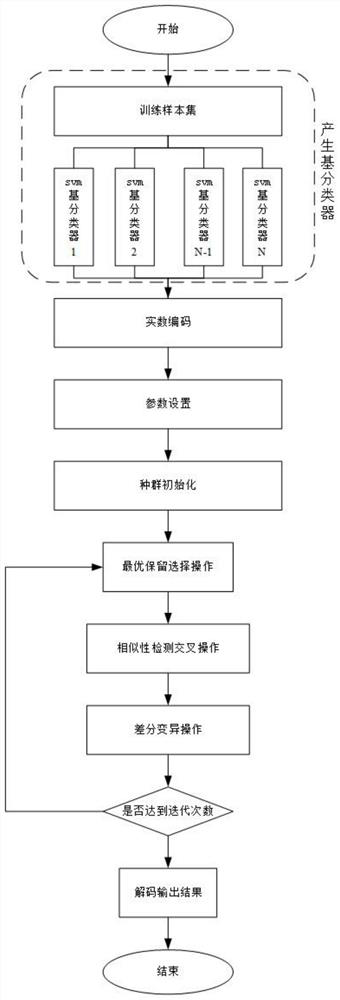Selective Ensemble Face Recognition Method Based on Genetic Algorithm and Differential Evolution
A technology of differential evolution and genetic algorithm, which is applied in the field of machine learning and pattern recognition, can solve the problems of high model storage cost, low recognition rate, and high computational complexity, and achieve the goal of improving face recognition rate, reducing the number, and reducing storage costs Effect
- Summary
- Abstract
- Description
- Claims
- Application Information
AI Technical Summary
Problems solved by technology
Method used
Image
Examples
Embodiment Construction
[0029] Provide the explanation of each detailed problem involved in the technical scheme of this invention below in detail:
[0030] The convergence analysis of differential evolution is similar to the analysis of genetic algorithm, both of which are based on Markov chain. This chapter starts from the definition and limitation of Markov chain, and briefly introduces its convergence.
[0031] Assume a random initial sequence {x n ; n≥0} is a random value on the discrete variable, and all sets of discrete values are denoted as H L ={j}, called H L is the state space, if for any n≥1, i k ∈ H L (k≤n+1) satisfies the following formula:
[0032] P{x n+1 = i n+1 |x n = i n ,···,x 0 = i 0}=P{x n+1 = i n+1 |x n = i n} (1-3)
[0033] then {x n ; n≥0} can be called a Markov chain.
[0034] random initial sequence {x n ; n≥0} state space H L For different problems, its state can be divided into finite and infinite. As for the differential evolution algorithm, because ...
PUM
 Login to View More
Login to View More Abstract
Description
Claims
Application Information
 Login to View More
Login to View More - R&D
- Intellectual Property
- Life Sciences
- Materials
- Tech Scout
- Unparalleled Data Quality
- Higher Quality Content
- 60% Fewer Hallucinations
Browse by: Latest US Patents, China's latest patents, Technical Efficacy Thesaurus, Application Domain, Technology Topic, Popular Technical Reports.
© 2025 PatSnap. All rights reserved.Legal|Privacy policy|Modern Slavery Act Transparency Statement|Sitemap|About US| Contact US: help@patsnap.com



